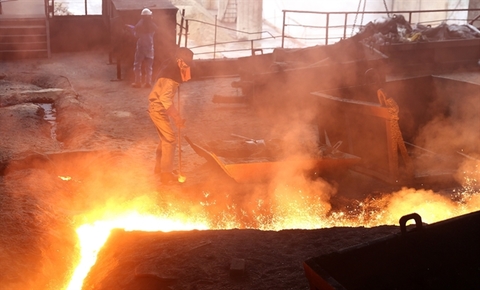
Workers at a steel mill in Lào Cai Province. Coal-powered facilities like steel mills would have to pay twice for their environmental impact if the draft decree becomes law. — VNA/VNS Photo Quốc Khánh.
The new environmental fees imposed on gas-emitting facilities under a draft decree could lead to duplicate taxation.
That was the comment of the Vietnam Chamber of Commerce and Industry (VCCI) on a draft decree drawn up recently by the Ministry of Finance, which was aimed at reducing greenhouse gas emissions through financial measures.
VCCI said the decree would incur new environmental expenses on petrol-, oil-, and coal-powered facilities since the fuels are categorised as the main sources of greenhouse gas emissions.
However, the expenses would overlap with the environmental tariffs that have been factored into fuel prices under the Law on Environment Protection Tariffs (LEPT). In other words, the decree would cause the facilities to be charged twice for their environmental impact.
VCCI suggested several revisions to the decree to avert duplicate taxation. For example, petrol-, oil-, and coal-powered facilities could be made entitled to tax credits, which they would use to set against the environmental fees.
If a system of tax credits for the facilities is too complicated to establish, the ministry could push the National Assembly for the abolishment of the environmental tariffs and set the fee mechanism introduced by the decree into motion.
VCCI also said the decree is problematic because it does not establish different fee levels for different locations in which gas-emitting facilities are located. In fact, facilities situated in urban locations are likely to pose greater risks to public health than those in non-urban, so they should be subject to higher fees.
"The decree should be revised in such a way that it incentivises the relocation of gas-emitting facilities from urban to non-urban areas, reducing air pollution in densely populated cities," VCCI said.
From VCCI's perspective, the fees introduced by the decree would be more effective in reducing gas emissions than the tariffs imposed by LEPT because the former is based on facilities' actual environmental impact whereas the latter, their consumption of fuels.
As such, the fees would act as a driving force for facilities to embrace emission control and improve combustion technology. The downside is that they require more monitoring efforts for environmental watchdogs than the tariffs. — VNS